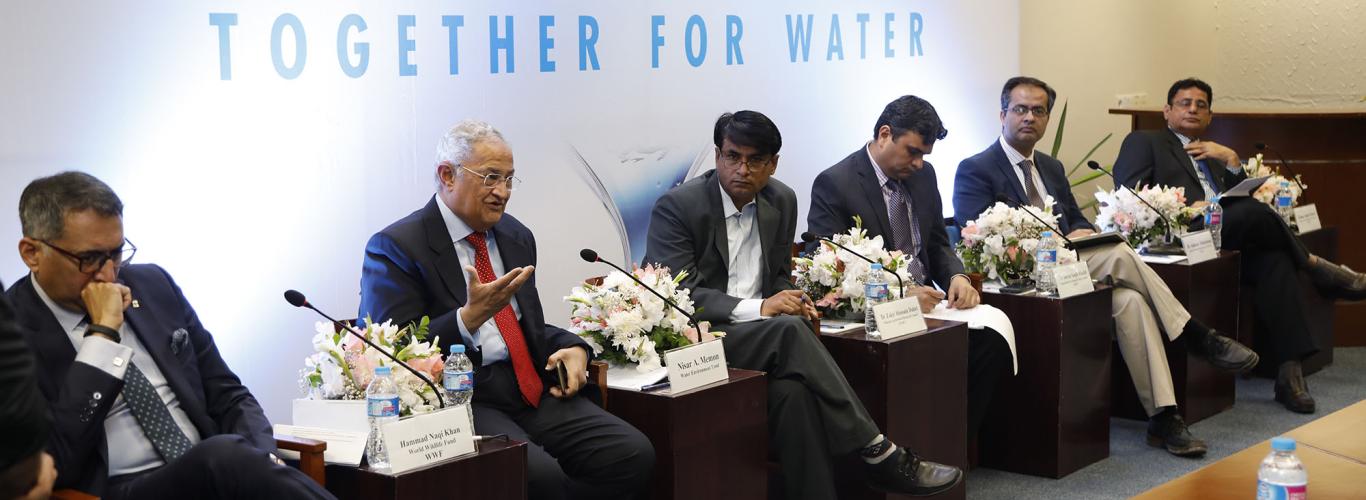World Water Day at LUMS
Panellists while discussing World Water Day concurred that water resources, if managed properly, by all actors collectively, would ensure that everyone has access to it. They agreed that human behaviour, social customs, institutions, and government policies heavily influence conservation of water.
The discussion took place at a seminar “Together for Water”, held jointly by Nestlé Pakistan and Lahore University of Management Sciences (LUMS). The panellists represented a range of stakeholders; from think-tanks to academia and from the government to private sector. The seminar highlighted issues faced by Pakistan, stressing possible solutions and a collaborative approach towards water conservation.
Ensuring availability and sustainable management of water and sanitation for all is also goal number six of sustainable development goals (SDGs) by United Nations which signifies its importance. Pakistan has the world’s fourth highest rate of water use. The water intensity rate the amount of water in cubic meters used per unit of GDP- is also the highest in the world, suggesting that the country’s economy is more water-intensive. This wastage of water must be halted to further dive into the pool of scarcity.
Highlighting the importance of finding nature-based solutions to water conservation, Hammad Naqi, CEO, WWF-Pakistan said “WWF-Pakistan is committed to promoting nature-based solutions to conserving and restoring water resources of Pakistan. This encompasses a holistic approach to water stewardship, security and conservation combined. “He gave the example of how WWF is working with companies like Nestlé to implement an international water standard that promotes the use of water in a socially equitable, economically beneficial, and environmentally sustainable way, through a stakeholder inclusive approach.
Nisar Memon, Chairman of Water Environment Forum, talked about water governance in Pakistan, saying, “People and Governments of Pakistan are together to protect, preserve and plan water assets of Pakistan such as the 7235 glaciers and our major rivers - Indus, Jhelum and Chenab. The climate change challenges are being met with our 2013 National Climate Change Policy and today as we meet here in LUMS Lahore, the Council of Common Interests meeting in planned in Islamabad to approve the National Water Policy to ensure water-energy-food for our over 210 million is well governed."
Dr Zakir Hussain, Principal Scientific Officer, Pakistan Agricultural Research Council said “Pakistan’s agriculture is increasingly vulnerable to the vagaries of climate change. Improving farmers’ resilience to climate change requires a more efficient use and equitable distribution of irrigation water, agricultural insurance to protect farmers against losses, and support from the government in adopting climate-smart agricultural practices.”
Dr Abubakar Muhammad from the Centre of Water Informatics and Technology, LUMS talked about how technology can be used in agriculture for efficient water management. He also stressed the need for industry working with academia to find solutions, using Nestlé-WIT relationship as a model. The two partners are working on smart soil sensors that can help farmers to reduce water usage in agriculture and also avoid crop stress due to over and under irrigation.
About WIT Center, LUMS
Centre for Water Informatics & Technology (WIT) was established at the Lahore University of Management Sciences (LUMS) in January, 2016. Housed at the Syed Babar Ali School of Science and Engineering (SBASSE), WIT aims to serve as a hub with a disciplinary focus on hydro-informatics and systems analysis but touching multidisciplinary research themes in water by engaging faculty and students from all departments of SBASSE; and by forging collaborations among the different schools within LUMS to provide the much needed, interdisciplinary perspective to water issues, under the guidance of a world-class advisory group.
WIT research and training programs will work to cross the boundaries of traditional scientific disciplines to foster an interdisciplinary understanding of water. Additionally, WIT will help to bridge the gap between academia and practice and establish a fruitful co-operation between the academic community and industry, development agencies, NGOs, public administration, local communities, and other relevant institutions for building capacity in innovation and technology for water management. WIT will also promote a new mindset that redirects researchers’ focus away from overly theoretical concepts towards new and innovative research solutions that are sustainable and cost-effective.
For further information, please contact:
Soban Hameed Saigol
Manager Administration, WIT-LUMS
Contact number: 0332-449-5057
Email: soban.hameed@lums.edu.pk





